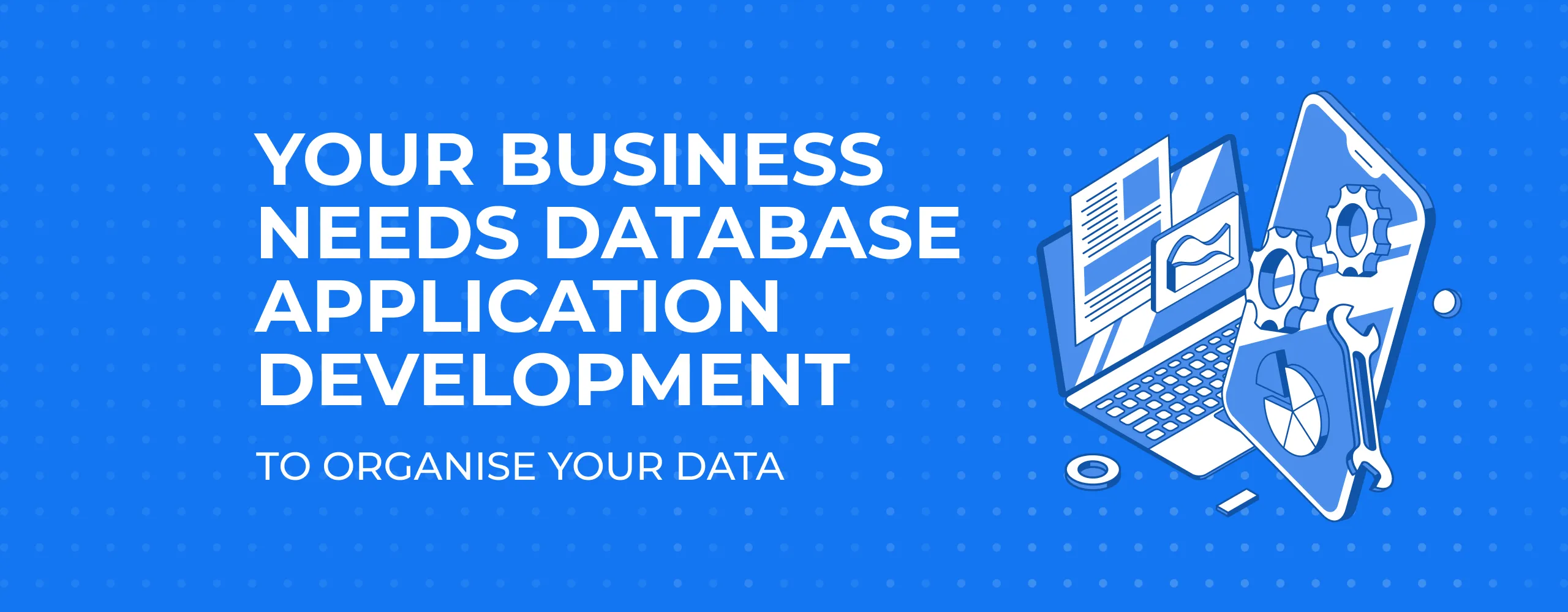
Your Business Needs Database Application Development to Organise Your Data

Nearly every company now works with a huge volume of data: from goods items and personal data to statistics for phone calls, site visitors, transactions and offline buyers. Regardless of the type of business you’re running, the structuring of you figures and DB analysis forms a necessary part of any growing company’s workload. Here are some tips to help you choose the best database application criteria for your company’s DB development.
Database Application: What Is It?
Database apps are software programs designed to collect, manage and sample information. Many small business owners opt for the development of easy-to-use bases such as customer contact lists and address books with handy software such as Microsoft Access and FileMaker Pro. SQL Server, Oracle and FoxPro are examples of applications with programming languages that can be used for the development of custom enterprise solutions in a networked environment.
Here are the common database types:
- Desktop: A simple and inexpensive solution commonly used by single users who work on a desktop or PC. Cost: Nominal.
- Server: Generally for multi-user bases, this platform allows you to organise and update large amounts of data. Most popular products: Microsoft SQL Server, Oracle, MySQL. Cost: Considerable.
- Web-Enabled: Today, most applications combine web integration with a desktop platform. Most popular products: Microsoft Access. Cost: Moderate.
Purpose
Database application development, whether custom or off-the-shelf, is a good decision when you need a handy tool for searching, sorting, calculating, reporting and sharing information. A base may also contain code to perform mathematical and statistical calculations to support queries sent by users. Such applications provide security by restricting access to data based on usernames and passwords. Most apps are customised using a database programming language to automate a specific type of work.
Accounting systems
An accounting system is a custom application for managing financial figures. Custom forms are used to record assets, liabilities, inventory and transactions between customers and suppliers. The resulting income statements, orders, balance sheets and invoices are customised reports based on information entered in the database. Accounting applications can run on a single computer for small businesses or in a shared network environment to accommodate the needs of multiple departments and locations of large organisations. Microsoft Money, QuickBooks, and Peachtree are accounting systems based on database applications.
CRM Application
Customer Relationship Management (CRM) is another example of a database application that has been customised to manage marketing and sales and support relationships between an organisation and its customers. The ultimate goal is to maximise sales, minimise costs and promote strategic relationships with customers. Simple contact DB (such as ACT) or task managers in Microsoft "Outlook" can be customised to fit the personal needs of startupers and young entrepreneurs. Salesforce.com, SAP and Oracle's Siebel are robust CRM applications for large enterprises.
Web App
Many contemporary websites comprise major components put together using multiple database applications. Most retail store sites, including Amazon, use such systems to store, update and display information for products on sale. These sites also incorporate an accounting system to record sales transactions and a CRM to integrate feedback and generate a positive customer experience. The popular Facebook web-based application is essentially a database built on the MySQL system and is an indication of the growing use of database apps as the basis for web-based application development.
Spreadsheets - Simple, but Absolutely Reckless
Simple spreadsheets have long been the cornerstone of office software. However, while enterprise and small dataset analysis are useful, there are some essential business tasks that cannot be addressed in this way.
Is it possible to check the data in the worksheet?
When dealing with large amounts of information, errors are inevitable. Spreadsheets are unable, for example, to flag incorrect data entry.
Can data relationships be established?
Although figures can be structured into a single spreadsheet, it is not possible to relate it to data in other workbooks.
How to enlarge a worksheet?
Although spreadsheets are expandable, they become bulky and unstable as the dataset grows - they may crash, or respond slowly.
Large Amounts of Data Require Systematisation
With the expansion of a business, data complexity also grows. Relying on spreadsheets to process information and emerging processes can result in data gathering that can eventually lead to a slowdown.
When a worksheet becomes unmanageable, database application development can redeem it. As the company dataset continues to grow, structured information and convenient interface become a necessity. With such applications, users can define custom roles by adding their own code to database-modelled data, providing user-based authorisation, deploying business-specific workflows and more.
- Data relationship - Information from different systems may be relevant and can be searched using drop-down menus, check boxes etc.
- Usability - Applications can be hosted in a cloud as well as locally, providing maximum access.
- Flexibility - The DB can be expanded to meet the needs of your firm. Regardless of the amount of the data, database system development will structurise, back up and provide you with necessary functions such as sampling, searching, security and the overall convenience of a user-friendly interface.
- Selective sharing - Simply share the information your users need rather than give them access to the entire set of data.
Warnings in Traditional Database Applications
Input and manipulation of data requires commands encoded as queries. This requires programming in SQL (Structured Query Language), which is why most small and medium-sized companies use paper systems to manage their information. While this may be applicable to small amounts of data, using paper to deal with an ever-increasing flow of information can cause confusion.
Choose the Best Database Software - Consider How to Use Data
Your decision will depend on your budget, the size of your business and the purpose of the database development. Ask yourself: "What sort of value do I want to get and what is the right tool for this job?"
- Formulate a strategic plan - Start with a complete financial strategy that illustrates the range of software development your business really needs to support its operational objectives.
- Decide what type of information you want to organise and how you will access and make use of it.
- Before you decide whether you need custom software development instead of an off-the-shelf package, sit back and evaluate all your needs. Think about your budget, who will use and maintain the base and what tasks they will execute.
- Clearly define the needs of employees to achieve these goals. If you have complex requirements, you can choose a server platform. If budgeting and ease of use are a problem, desktop databases may be more suited to your needs. If you’re looking for more flexibility and openness, web-enabled database development may be more suitable.
- Web-based solutions are beneficial to organisations that want to have the same CRM and CMS capabilities run by the same base.
Tip: Make sure your software supports both PC and Mac platforms. If you choose a hosting option, you will face no trouble, as users simply log on to your site to access the information. If you choose a server-based solution, PC and Mac platform issues can be more complicated to develop.
Conclusion
Real-time data management is a very challenging task and can affect your business’s performance. Therefore, it should be left to the experts. As a value-added development service provider in the industry, Magora is committed to providing high-quality agile services for DB programming.
Development of database applications can help:
- Increase productivity and business efficiency.
- Structurise, manage and control large amounts of information.
- Protect your corporate information privacy, providing a secure connection to data only for authorised users.
Developing a good base with the help of experts is the most beneficial way to effectively manage your information and fully analyse your data.
We work with different clients around the world to meet the diverse needs of a wide range of industries, so do not hesitate to share your thoughts - Magora experts are here to help!





